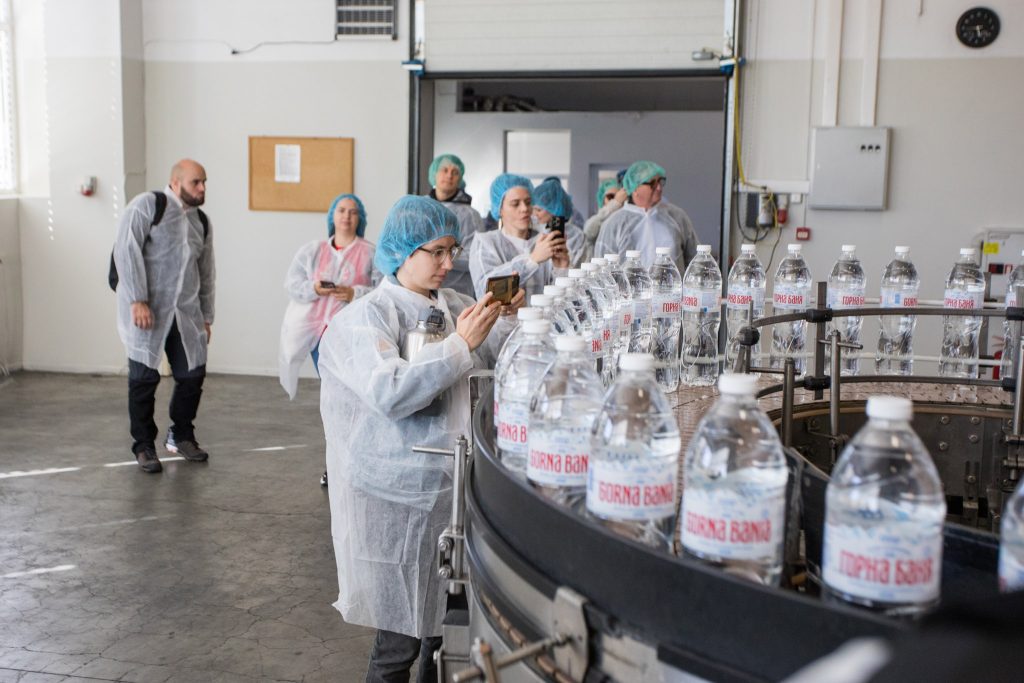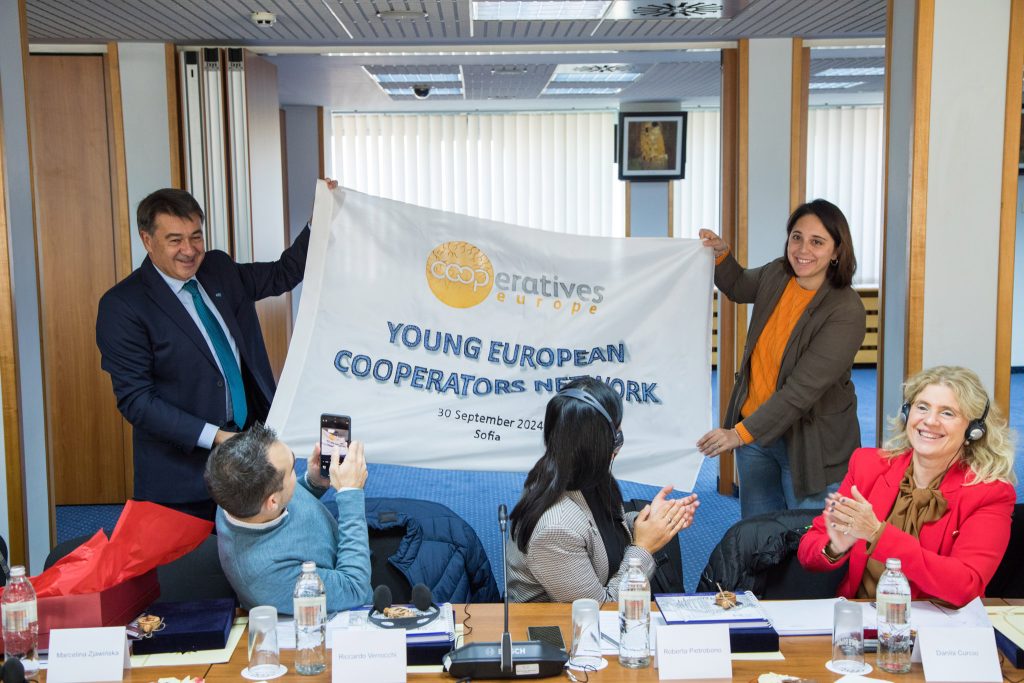How do young people learn about the European co-operative movement? How can it be made easier for them to participate actively in the broader movement? What challenges do young co-operators face, and how can these obstacles be overcome?
These questions were on the agenda at the European Youth Cooperative Forum which took place in Sofia, Bulgaria, in October. Organised by Cooperatives Europe and hosted by the Central Cooperative Union (CCU) of Bulgaria, the event brought 30 young co-operators from 11 European countries together with Cooperatives Europe board members around the topic of “Youth and Cooperative Governance”.
Cooperatives Europe is the European regional office of the International Co-operative Alliance, representing 84 member organisations from 33 European countries across all business sectors. These represent 163 million individual member co-operators, owning 250,000 co-operative enterprises, which provide jobs to 5.4 million European citizens.
Of these 5.4 million co-op jobs, an estimated 3% are held by people under 35, equating to 150,000 young co-operative workers.
“The result is impressive,” says Cooperatives Europe and CCU Bulgaria president, Petar Stefanov. “This figure deserves special attention, and we believe that supporting young co-operators with a dedicated budget within Cooperatives Europe is essential.”
Stefanov welcomed delegates on the morning of the conference, describing young people as “the most valuable asset of the European co-op movement”, and “the only one that guarantees sustainability of the movement”.
ICA director general Jeroen Douglas also attended, highlighting the current generation of European leaders’ shortcomings when it comes to tackling global conflict, meeting climate targets and making progress towards the UN’s Sustainable Development Goals.
“My generation … we only can say we have failed. Everything that we have done is precisely the opposite of what you, youth, have to pick up,” said Douglas.
“The good thing is”, he added, “that there are 150,000 exquisite leaders here in Europe alone, who can bring our story further.”

The Forum heard from a number of these leaders during its first session, as a panel of young co-operators from various countries and sectors were invited to share their experiences of the movement, and how their co-ops are engaging with young people.
Krasimir Ignatov, director general of international affairs at CCU Bulgaria, gave an overview of the Bulgarian co-op movement and how it is working with the next generation of young co-operators.
Ignatov explained that Bulgaria’s co-op history dates back to 1890 – later in the day, the delegation would explore this history further at the country’s National Cooperative Museum, which is housed in CCU’s headquarters.
Related: GenoDigital barcamp gathers a new generation of co-operators
CCU Bulgaria, established in 1947, is made up of 31 co-operative unions representing 750 societies. Its enterprises range from retail to healthcare to water bottling, which members of the Youth Forum were able to visit in person during a study tour the following day.
This year is Bulgaria’s fourth time hosting a Youth Forum, with previous events held in Kiten and Nessebar. CCU has also run a number of initiatives to develop young co-operation, including a collaboration with the Danish Cooperative Employers’ Organisation, Kooperationen.
Next up on the panel were members of UK-based Seasalt student housing co-op. Genevieve Duque Adão and Mara Talbot shared key lessons from their experience, including the importance of finding the right people for your co-op, sharing knowledge among members and reaching out to the wider movement for support.
Central Co-operative’s people advisor, Ellie Lockley, offered insights into how the UK co-op retailer is supporting young people through the various stages of life, from early years to starting out in the workplace. After the session, Lockley reflected on her experience of joining Central when she was 21 years old, and how this introduced her to the world of co-operatives.
“I’m really grateful for that opportunity. And it’s somewhere that I personally see myself working for many, many years to come. [When I first joined] I didn’t really understand the concept of a co-operative, so I’m looking forward to how we can spread that message and encourage people to join the society, and understand what we do and what we’re about.”
For Lockley, communication is key when it comes to spreading the co-op message to young people.
“What needs to happen is engagement with youth through channels that they use. Social media is the new channel … And I think if we want to grow youth membership, that is probably the only way that we’re going to do it.”
The need to modernise ways of working was a key topic of discussion throughout the conference, from flexible working patterns to the adoption of new technology.

CCU Bulgaria president, Petar Stefanov, and Anna Loscalzo, president of the Young European Cooperators Network
During the second session of the day Matti Pannenbaecker spoke about his initiative #Genodigital, which engages in political advocacy and community building to bring Germany’s co-op movement into the digital world. At present, people in Germany can only join co-operatives by submitting a paper form, something #Genodigital is working to update.
Other speakers in this session included Mariana Holynska from Lviv University of Trade and Economics, Ukraine, who shared how the co-op movement is persevering during the realities of war in her home country.
“The secret is in the quality of interaction,” she said. “Each organisation that is part of the Ukrainian co-op [movement] supports each other and helps in difficult moments.”
The event’s keynote address was given by co-operative professor Anu Puusa from Finland, who emphasised the role of education in strengthening the movement.
Related: Young co-operators: Leaders of tomorrow, leading today
“Everything starts with knowledge”, said Puusa, explaining that many of the students she works with have little to no understanding of what a co-op is.
“However, once they get more information, their interest is always piqued, because these values are relatable, and people really associate with them once they hear about it.”
Marcelina Zjawinska, vice-president of the Young European Cooperators Network and vice-president of the ICA Youth Committee, reflected back some of the Forum’s key discussion points in her closing remarks.
Zjawinska noted the tension between the market forces and co-operative values, as well as the challenge of how to communicate the co-op movement to new generations both inside and beyond it.
She stressed the importance of having a variety of ways of communicating for different audiences, along with the key role of long-term education for co-operators at all levels of their leadership journeys.
Zjawinska was also keen to point out that while attracting newcomers to the movement is necessary, existing co-operators must not be overlooked.
“Every single co-operator that drifts away from the movement is our great, great failure, and this happens too often. So let’s not forget the people that are already with us that also have to be taken care of.”
The following day, Zjawinska described the Forum as a highlight of her co-operative journey to date.
“As we can see, all of us in different countries, in different regions, we are facing similar challenges … It’s really supportive when you have a community and you can share those challenges.
“I’m really glad to be here and to know all these amazing people, and to be part of this international community. It’s a super empowering and amazing thing.”
One of the key ways this community can now come together is through the Young European Cooperators Network (YECN). Launched last year, the YECN is an informal network composed of young co-operators under the age of 40 from across Europe. It exists to advance the interests of young co-operators by fostering exchanges, sharing best practices, and offering members new opportunities within the movement and beyond.
Reflecting on her experience of the Forum, YECN’s president, Anna Loscalzo, said: “I’m really satisfied, because our dialogue has been really intense and really deep. We have heard so many voices, so different from each other, and this is one of the most interesting powers of the co-operative movement, trying to keep together such different voices.”
Whilst at the event, members of the Forum passed a resolution laying out the intentions for the future of the YECN:
“We, the participants of this Youth Forum, commit ourselves to actively engage in the activities of the YECN, fully embracing the co-operative values and principles. We pledge to work towards strengthening the co-operative movement and, in doing so, fortifying the youth network,” read the resolution.
“Our ultimate goal is to establish YECN as an official autonomous entity capable of representing young co-operators across Europe. YECN will develop, through a democratic, fair and participatory process, a statute that defines the organisation’s roles, responsibilities, and objectives.
“We are committed to delivering a clear plan to achieve this objective by December 2024.”
Nevena Bukova, of CCU’s International Affairs Directorate, shared that she had been “inspired” by the events of the Youth Forum, adding, “I believe the adopted youth forum resolution will strengthen the YECN network, and hope that, turning words into actions, YECN will soon have its own statutes”.
A Forum delegate from Mediacoop in Malta, Isabel Mallia, described the event as “enlightening”, adding: “It was a really democratic way of going about it as well. It wasn’t the sort of traditional conference where it was just presentations and a one way conversation. It was a very holistic discussion and a very inclusive one at that.
“The co-op movement is an amazing way of communicating a really beautiful message. It’s all about empowerment. And I feel like if we really focus on that, then our future could really be amazing.”

